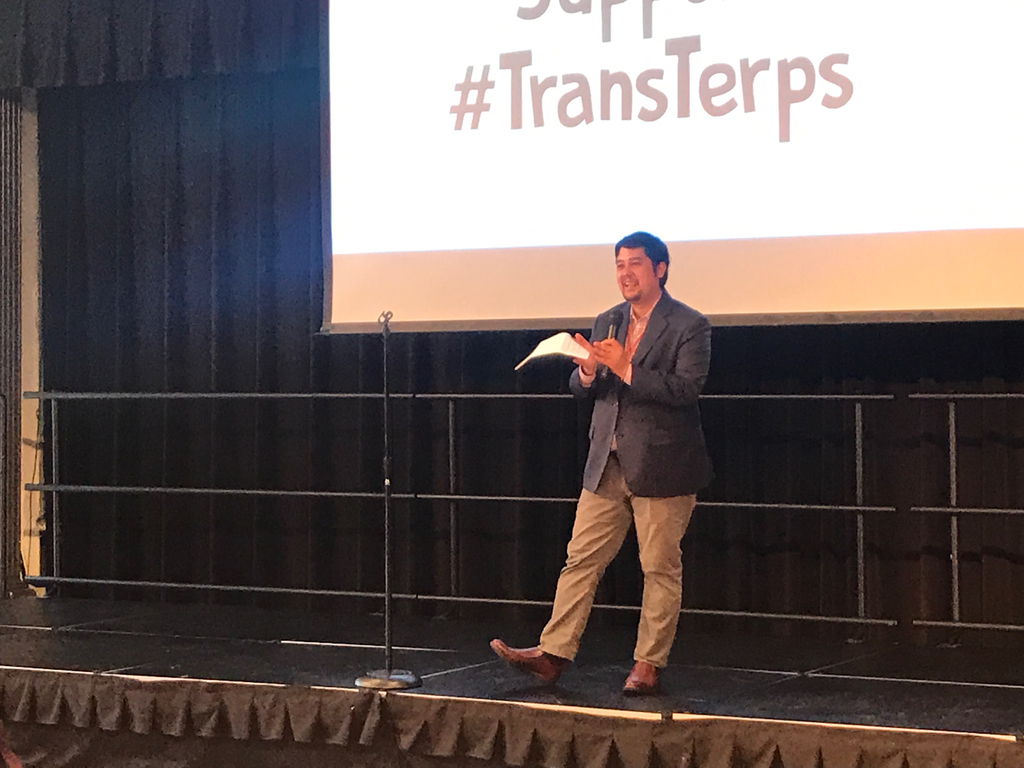Ruth Elizabeth Morris, an academic coordinator at the University of Maryland, wore a small pink button with the word “she” on it during orientations with incoming freshmen and transfer students in August.
Some students questioned why she was wearing it, she said.
“It’s a good conversation starter,” Morris said. “It gives me a chance to say, ‘Well, the pronoun that I use is ‘she,’ and it’s important on campus that we’re respecting each other’s pronouns, and sometimes it’s not obvious the pronouns someone wants to use, so a button can be a great way to help people out.'”
The buttons are part of the LGBT Equity Center’s #TransTerps campaign, which aims to improve the campus climate for transgender people. The campaign was officially launched Thursday during Quelcome, a welcome event in Stamp Student Union’s Colony Ballroom for members of the LGBTQ community and their allies.
The campaign involves sharing good practices for transgender inclusion, sharing campus resources for transgender people and holding trainings and events.
[Read more: UMD employee receives nation’s first gender-neutral driver’s license]
“A lot of people want to be more inclusive but don’t really know how, and so we wanted to provide more concrete tools for that,” said Nic Sakurai, the Equity Center’s acting director.
The campaign’s website lists about 40 participating departments and groups at this university, as well as about 60 task force volunteers that have signed onto the project.
Campus offices and departments that choose to participate can complete an online internal assessment of their own practices to see what initiatives they could implement to foster more inclusion, Sakurai said, adding that nothing in it is mandatory.
“We definitely encourage every organization and unit that’s engaging in this to think about their own context and what makes sense to [them],” Sakurai said.
The project has already seen engagement before the official launch, Sakurai said.
Before Thursday, the Equity Center distributed 60 baskets all over the campus, Sakurai said, with materials such as pronoun buttons and stickers with a terrapin sporting the colors of the transgender flag — blue, pink and white.
“Now we’ve had people telling us, ‘Oh, we’re running out of materials already,'” Sakurai said. “And the semester just started. So we have a happy problem of not having enough materials and needing to raise more funds to get more.”
The campaign has already raised almost $12,000 that has gone toward T-shirts with the #TransTerps logo, baskets and pronoun information cards, among other things. Some of these items were dispersed during the official launch.
Sakurai said they started to think of the idea for the project after the 2016 mass shooting at Pulse, a gay nightclub in Orlando, that left 50 dead.
[Read more: Trump’s transgender military ban isn’t sitting well with members of UMD’s LGBT community]
“We were really thinking as a center, ‘How can we make a broader impact on campus?'” they said. “There’s a lot going on, and how do we improve the climate?”
Along with a list of resources for transgender people on the campus and best practices for the university community, the campaign’s website also includes a new video about sharing pronouns. The video, posted in late August, has received about 900 views on YouTube and almost 10,000 views on its Facebook in less than a month.
Sakurai said they hope to create more of these types of educational videos to reach more people.
“You can only train so many people face to face without hiring more staff,” Sakurai said. “And so that can be quite a limitation when you can only train a couple hundred people in a year when you have basically a small city of 50,000 students and employees.”
Morris, a task force member, said she’s been active in the letters and sciences office to help its staff become more “visible as allies on campus to our students.” Morris added that most of the staff has been very receptive about the program.
“Part of creating a welcoming community is being visibly there,” Morris said. “We don’t want it to be a secret. … We want them to see us wearing pronoun buttons and know that this is a place where people talk about these things in a really positive way.”
Cecilia Franck, a senior Spanish major, said they became a task force member after receiving an email about the campaign over the summer.
“It’s such a big issue with trans people and inclusion right now,” Franck said. “There’s a lot of places where it’s really unsafe to be trans. I really want this campus to be safe for people like me and my friends and my partners.”



